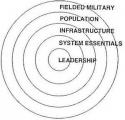Greetings from Canada, where I am an energy researcher for a national farm organization.
My interest is primarily in the following aspects of energy security:
- peak oil (false alarm or legitimate threat?)
- recent warnings re impending decline in oil exports
- government emergency planning for fuel emergencies
Although some of the most progressive research is coming from military/security analysts, I fear that certain aspects of energy security (and most especially the matter of fuel emergencies) are being largely overlooked by civilian and military authorities alike.
An Energy Security thread was started at Armed Forces Journal last October because I wanted to put the relevant research before a primarily military/security audience (primarily to ensure that they are aware of it, but I also hope to receive input from this audience).
To make it easier for SWC members, I will start re-posting some of the AFJ info here, but in the meantime I would invite you to examine the info at AFJ:
http://www.afji.com/forums/
Please click on General, then on Energy Security (usually the first item)
My hope is that this topic will be of interest to SWC participants.
Thanks very much for considering this.
Rick M in Ontario





 Reply With Quote
Reply With Quote







Bookmarks